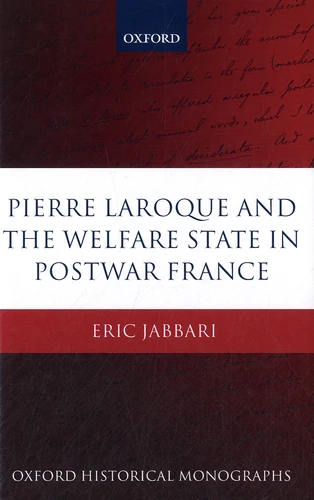Pierre Laroque and the Welfare State in Postwar France
Par :Formats :
- Paiement en ligne :
- Livraison à domicile ou en point Mondial Relay indisponible
- Retrait Click and Collect en magasin gratuit
- Réservation en ligne avec paiement en magasin :
- Indisponible pour réserver et payer en magasin
- Nombre de pages188
- PrésentationRelié
- FormatGrand Format
- Poids0.38 kg
- Dimensions14,5 cm × 22,0 cm × 2,0 cm
- ISBN978-0-19-928963-9
- EAN9780199289639
- Date de parution01/10/2015
- CollectionOxford Historical Monographs
- ÉditeurOxford University Press
Résumé
Eric Jabbari examines Pierre Laroque's contribution to the rise of the French welfare state, focusing on his role as the architect of the social security plan that was adopted by the provisional government in 1945. French social security reflected the diverse set of influences which had marked his pre-war career, namely his background in administrative law and his onetime support for the corporatist management of industrial relations.
Before the outbreak of the war, he had come to believe in the necessity of an increased state interventionism which was mitigated by administrative decentralization. Laroque maintained that the ultimate purpose of social policy was to cultivate social solidarity, a task which could best be achieved if its beneficiaries participated in the management of the relevant public services. While Laroque had lost his enthusiasm for corporatism by the late thirties, he remained true to its underlying principles, and these ideas would come to define his conception of social security in post-Liberation France.
Before the outbreak of the war, he had come to believe in the necessity of an increased state interventionism which was mitigated by administrative decentralization. Laroque maintained that the ultimate purpose of social policy was to cultivate social solidarity, a task which could best be achieved if its beneficiaries participated in the management of the relevant public services. While Laroque had lost his enthusiasm for corporatism by the late thirties, he remained true to its underlying principles, and these ideas would come to define his conception of social security in post-Liberation France.
Eric Jabbari examines Pierre Laroque's contribution to the rise of the French welfare state, focusing on his role as the architect of the social security plan that was adopted by the provisional government in 1945. French social security reflected the diverse set of influences which had marked his pre-war career, namely his background in administrative law and his onetime support for the corporatist management of industrial relations.
Before the outbreak of the war, he had come to believe in the necessity of an increased state interventionism which was mitigated by administrative decentralization. Laroque maintained that the ultimate purpose of social policy was to cultivate social solidarity, a task which could best be achieved if its beneficiaries participated in the management of the relevant public services. While Laroque had lost his enthusiasm for corporatism by the late thirties, he remained true to its underlying principles, and these ideas would come to define his conception of social security in post-Liberation France.
Before the outbreak of the war, he had come to believe in the necessity of an increased state interventionism which was mitigated by administrative decentralization. Laroque maintained that the ultimate purpose of social policy was to cultivate social solidarity, a task which could best be achieved if its beneficiaries participated in the management of the relevant public services. While Laroque had lost his enthusiasm for corporatism by the late thirties, he remained true to its underlying principles, and these ideas would come to define his conception of social security in post-Liberation France.


